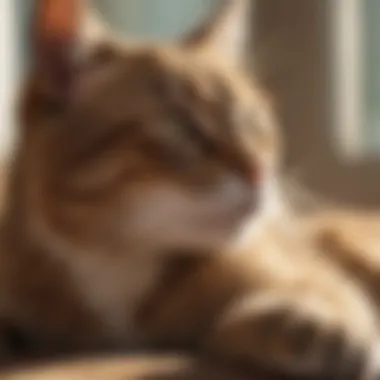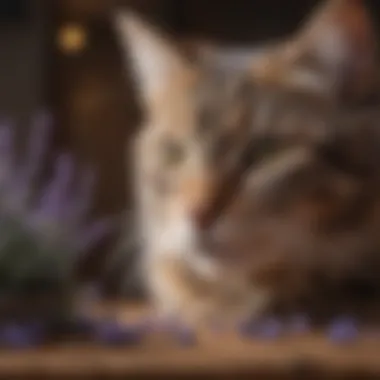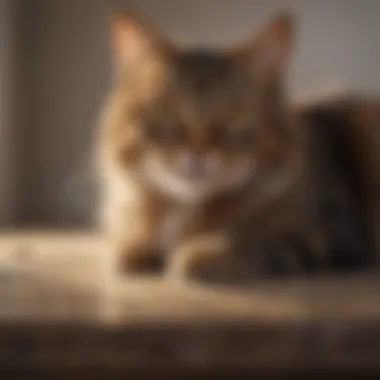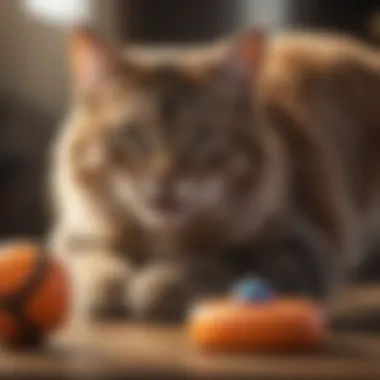Effective Strategies for Destressing Your Feline Companion: A Comprehensive Guide


Pet Care Essentials
When it comes to destressing your cat, focusing on their pet care essentials is crucial. Daily nutrition requirements play a significant role in your feline friend's overall well-being. Ensuring they receive balanced meals rich in essential nutrients is key to a healthy and happy cat. Exercise and playtime are essential for keeping your cat mentally stimulated and physically active. Incorporating interactive toys and engaging activities into their routine can help reduce stress levels. Grooming tips are also vital to your cat's relaxation. Regular brushing not only helps maintain their coat but also creates a bonding experience.
Behavior & Training
Understanding your pet's body language is fundamental in addressing their stressors. Cats communicate through subtle cues that can indicate fear, anxiety, or contentment. Learning these signals can help you better respond to their needs. Basic training techniques, such as positive reinforcement, can aid in reducing stress and anxiety. Addressing behavioral concerns with patience and consistency is essential. Socialization tips are also beneficial for creating a harmonious environment for your cat.
Pet Home Environment
Creating a pet-friendly space is essential for your cat's well-being. Designate areas where your cat can retreat to when feeling overwhelmed. Implement safety measures to prevent accidents and ensure a secure environment. Choosing the right toys and accessories that stimulate your cat's senses can provide enriching experiences. Setting up a comfortable resting area with cozy bedding and hiding spots can offer a safe haven for your feline companion.
Pet Health Issues
Recognizing signs of illness early on is crucial for your cat's health. Regular health check-ups and preventative care measures can help identify and address potential issues promptly. Familiarize yourself with common ailments such as urinary problems or digestive issues and their respective treatments. Establishing an emergency preparedness plan can make a significant difference in critical situations, ensuring your cat receives timely care.
Understanding Cat Stress
Understanding Cat Stress is a critical aspect in the realm of feline companions. By delving into the intricate world of cat psychology, owners can significantly enhance their understanding of their pets' well-being. Recognizing the stressors that affect cats is the cornerstone of establishing a harmonious relationship with them. It enables owners to preemptively identify potential triggers and take proactive measures to minimize stress levels.
Identifying Stressors in Cats
Physical factors
Physical factors encompass various elements such as health conditions, nutrition, and physical comfort. Understanding how these factors impact a cat's stress levels is imperative. For instance, an undiagnosed health issue can manifest as stress-related behavior. Creating a conducive physical environment involves providing quality food, ensuring hydration, and a comfortable resting place, all contributing to a cat's overall well-being.
Environmental triggers
Environmental triggers refer to external stimuli that can induce stress in cats, including loud noises, changes in routine, or the presence of unfamiliar animals. These triggers can disrupt a cat's sense of security and lead to heightened anxiety levels. Recognizing and minimizing these triggers in the cat's surroundings is essential for fostering a stress-free environment.


Behavioral changes
Behavioral changes in cats, such as increased irritability or excessive meowing, often indicate underlying stress. Identifying these changes early on can prevent escalating stress levels and potential health concerns. By addressing behavioral alterations promptly, cat owners can create a supportive environment that promotes emotional well-being.
Signs of Stress in Cats
Excessive grooming
Excessive grooming is a common manifestation of stress in cats and serves as a self-soothing mechanism. While grooming is a natural behavior, excessive indulgence may indicate underlying stress or anxiety. Monitoring grooming habits can provide valuable insights into a cat's emotional state and facilitate early intervention strategies.
Aggression
Aggression can stem from stress in cats and is often a defense mechanism triggered by perceived threats. Understanding the root cause of aggressive behavior, whether due to fear or anxiety, is crucial for implementing appropriate management strategies. Creating a safe and secure environment can help mitigate aggression and promote a sense of calmness in feline companions.
Avoidance behavior
Avoidance behavior, such as hiding or retreating, is a coping mechanism adopted by cats when stressed. While occasional seclusion is normal, persistent avoidance behavior warrants attention. Encouraging positive interactions and building trust through gentle approaches can gradually alleviate avoidance tendencies and strengthen the human-cat bond.
Creating a Stress-Free Environment
In this detailed guide on how to destress your feline companion, one critical aspect is creating a stress-free environment. A stress-free environment significantly impacts the well-being of your cat. This section delves into various elements that contribute to a harmonious atmosphere for your pet.
Providing Safe Spaces
- Comfortable hideouts: Comfortable hideouts play a pivotal role in ensuring your cat feels secure and relaxed. These hideouts offer your feline friend a cozy retreat where they can unwind and destress. Ease of access and privacy are key characteristics of comfortable hideouts, making them a popular choice for cat owners looking to provide solace for their pets.
- Vertical spaces: Vertical spaces are another essential component of a stress-free environment for cats. Cats naturally love to climb and perch high above ground level. Vertical spaces not only fulfill this instinctual need but also offer your cat a sense of safety and vantage point to observe their surroundings. The unique feature of vertical spaces lies in their ability to enrich your cat's environment with elevated perches, providing mental stimulation and opportunities for relaxation.
Managing Noise and Light
- Noise reduction techniques: Noise reduction techniques are crucial in maintaining a calm ambiance for your cat. By minimizing loud sounds that may startle or stress your pet, you create a soothing environment conducive to relaxation. The key characteristic of noise reduction techniques is their ability to create a peaceful atmosphere, enhancing your cat's overall well-being. Implementing these techniques can significantly reduce anxiety levels in your feline companion.
- Optimal lighting conditions: Optimal lighting is an often overlooked yet vital aspect of a stress-free environment. Cats are sensitive to lighting conditions, and ensuring appropriate lighting can positively impact their mood and behavior. The unique feature of optimal lighting conditions is their ability to create a soothing atmosphere, promoting relaxation and comfort for your cat. By optimizing lighting, you provide a conducive environment for your pet's mental and physical health.


Maintaining Consistent Routines
- Feeding schedules: Consistency in feeding schedules is essential for your cat's well-being and stress management. Cats thrive on routine, and predictable feeding times help maintain their sense of security and stability. The key characteristic of feeding schedules is their ability to establish a reliable routine that your cat can depend on, reducing uncertainty and anxiety. While variations in feeding times may lead to stress and behavioral issues, maintaining a consistent schedule promotes a calm and contented feline companion.
- Playtime routines: Playtime routines are not just about fun; they are vital for your cat's mental and physical stimulation. Regular play sessions provide exercise, mental engagement, and bonding opportunities for you and your pet. The unique feature of playtime routines lies in their ability to enrich your cat's daily life, preventing boredom and alleviating stress. By incorporating interactive play sessions into your cat's routine, you promote a healthy and happy lifestyle for your beloved pet.
Promoting Mental Stimulation
In the realm of destressing your cat, promoting mental stimulation takes precedence as a crucial element. This facet delves into engaging your feline friend's mind, ensuring they are mentally active and fulfilled. Mental stimulation plays a pivotal role in warding off stress and promoting overall well-being in cats. By encouraging mental exercises and activities, you can provide your cat with a sense of purpose and accomplishment, leading to a calmer and happier pet. Notably, mental stimulation helps mimic their natural instinctual behaviors, enhancing their cognitive abilities and minimizing anxiety.
Interactive Toys and Activities
Puzzle Feeders
Puzzle feeders are ingenious tools designed to challenge and engage your cat's problem-solving skills during meal times. These feeders require your cat to work for their food, stimulating their hunting instincts and keeping them mentally sharp. The key characteristic of puzzle feeders lies in their ability to slow down eating, promoting healthier digestion and preventing overeating. By incorporating puzzle feeders into your cat's routine, you provide a fun and rewarding way for them to enjoy their meals while enhancing their mental acuity. While puzzle feeders offer numerous benefits, such as reducing mealtime boredom and preventing obesity, minor disadvantages may include the initial learning curve for some cats.
Feather Wands
Feather wands serve as interactive toys that cater to your cat's innate desire to hunt and pounce. These toys mimic the thrill of catching prey, sparking your cat's interest and physical activity. The key characteristic of feather wands is their ability to simulate real-life hunting scenarios, allowing your cat to engage in a playful yet stimulating exercise. Their popularity stems from their effectiveness in promoting exercise and bonding between you and your pet. However, a potential disadvantage of feather wands is the need for supervision to prevent any accidental swallowing of small parts.
Enriching Your Cat's Environment
Scratching Posts
Scratching posts represent a vital aspect of enriching your cat's environment as they fulfill your cat's instinctive need to scratch and stretch. The key characteristic of scratching posts is their durable and textured surface, enticing your cat to engage in healthy scratching behavior. These posts offer a beneficial outlet for your cat to maintain their claws and relieve stress. Additionally, scratching posts help redirect any destructive scratching tendencies towards appropriate surfaces. Despite their advantages, scratching posts may pose a minor inconvenience in terms of space and placement within your home.
Window Perches
Window perches provide an elevated vantage point for your cat to observe the world outside while basking in the sunlight. The key characteristic of window perches lies in offering a comfortable and secure lounging spot that taps into your cat's natural curiosity. These perches are popular among cats for promoting mental relaxation and reducing anxiety by allowing them to enjoy the view while feeling safe and protected. However, a drawback of window perches could be potential conflicts if you have multiple cats vying for the same perch space.
Nutrition and Health Considerations


Nutrition and Health Considerations play a vital role in ensuring the overall well-being of your cat. The significance of providing a balanced diet cannot be overstated when it comes to destressing your feline companion. A thoughtful approach to nutrition can promote physical health, mental well-being, and reduce stress levels in cats. By focusing on elements such as quality cat food and hydration, pet owners can make a significant difference in their cat's overall happiness and stress management.
Balanced Diet
Quality Cat Food
Quality cat food stands out as a cornerstone of a balanced diet for feline friends. The key characteristic of quality cat food lies in its nutritional value and ingredients. Opting for premium-quality cat food ensures that your cat receives essential nutrients, vitamins, and minerals necessary for vitality and stress reduction. The unique feature of quality cat food is its commitment to using high-quality proteins and wholesome ingredients, promoting a healthy coat, strong immunity, and overall well-being. While the cost may be slightly higher, the benefits of quality cat food in promoting a stress-free environment and optimal health for your cat are unparalleled.
Hydration
Hydration is another crucial aspect of a cat's diet and overall health. Adequate water intake is essential for maintaining proper organ function, digestion, and overall hydration. Cats are notoriously picky about their water sources, so ensuring access to fresh, clean water at all times is imperative. Highlighting the importance of hydration in this article emphasizes the role of water in maintaining a cat's health and reducing stress levels. The unique feature of hydration lies in its simplicity yet profound impact on the well-being of cats. While there are no disadvantages to proper hydration, the benefits from reduced stress to improved organ function make it a cornerstone of destressing your beloved feline.
Regular Veterinary Check-ups
Regular veterinary check-ups form a fundamental part of your cat's overall health and stress management. Through preventive care and timely medical interventions, pet owners can proactively address health issues and minimize stress levels in their cats. These meticulous measures contribute significantly to your cat's happiness, well-being, and overall quality of life.
Preventive Care
Preventive care involves a proactive approach to maintaining your cat's health. By scheduling routine check-ups, vaccinations, and screenings, pet owners can detect potential health concerns early and prevent them from escalating. The key characteristic of preventive care is early intervention and disease prevention, which align perfectly with the goal of this article - destressing your cat. Choosing preventive care for your feline companion demonstrates a commitment to their long-term health and happiness. The unique feature of preventive care lies in its ability to save pet owners potential stress, costs, and most importantly, their cat's well-being.
Medical Interventions
Medical interventions refer to treatments, procedures, or surgeries recommended by veterinarians for specific health issues in cats. When preventive care is insufficient in addressing health concerns, medical interventions become necessary to alleviate pain, discomfort, or other conditions affecting a cat's well-being. The key characteristic of medical interventions is their targeted approach to resolving health issues and improving a cat's quality of life. Opting for medical interventions underscores the dedication to providing comprehensive care for your cat. The unique feature of medical interventions lies in their ability to address underlying health issues effectively and restore your cat's health and happiness. While there may be certain risks or costs associated with medical interventions, the benefits of improved well-being and reduced stress for your feline companion make them a critical component of destressing your cat.
Behavioral Techniques for Stress Management
In the realm of feline well-being, Behavioral Techniques for Stress Management stand out as a pivotal aspect that demands close attention. Understanding the intricate behavior patterns of cats and how to manipulate them positively can dramatically impact their stress levels. By delving into the nuances of Behavioral Techniques, pet owners can cultivate a harmonious environment conducive to their cat's mental welfare.
Positive Reinforcement Training, a cornerstone of Behavioral Techniques for Stress Management, embodies a methodical approach centered on rewarding desired behaviors. This training technique involves utilizing incentives like treats or affection to reinforce positive conduct. Clicker training, a specific subset of Positive Reinforcement Training, introduces a distinctive auditory cue like a clicker to mark desirable behaviors swiftly. The key advantage of Clicker training lies in its precise reinforcement of targeted actions, enhancing the cat's learning curve efficiently.
Reward-based methods, another facet of Positive Reinforcement Training, contribute significantly to alleviating stress in cats. By associating favorable behaviors with rewards, cats are motivated to exhibit positive conduct consistently. This method's efficacy lies in its ability to create a positive reinforcement loop, shaping long-term behavior patterns conducive to a stress-free feline existence.
Calming Solutions play a vital role in supplementing Behavioral Techniques, offering additional support in managing feline stress levels. Pheromone diffusers, a popular choice among pet owners, emit synthetic pheromones that mimic a cat's natural calming scents. This innovative solution aids in reducing anxiety and promoting relaxation in feline companions. However, one must consider the individual cat's response to pheromones, as effectiveness can vary depending on each cat's unique sensitivity.
Herbal remedies, another avenue of Calming Solutions, present a natural alternative to alleviate stress in cats. By harnessing the soothing properties of herbal extracts like valerian or chamomile, pet owners can provide holistic stress relief to their feline friends. The gentle calming effects of herbal remedies offer a non-invasive approach to anxiety management, promoting a serene environment for cats. Nevertheless, it is imperative to consult with a veterinarian before administering herbal remedies, ensuring compatibility with the cat's health and well-being.







